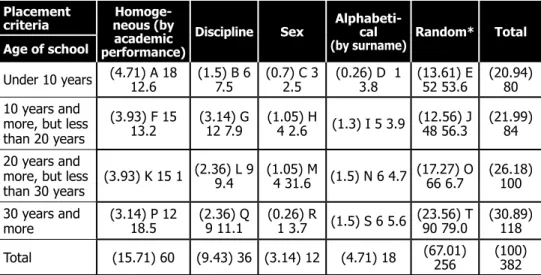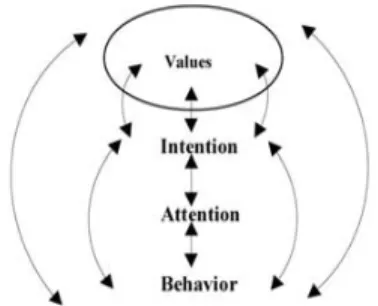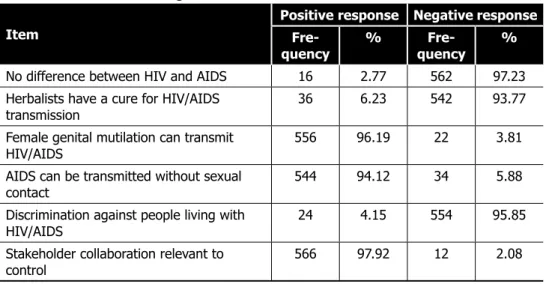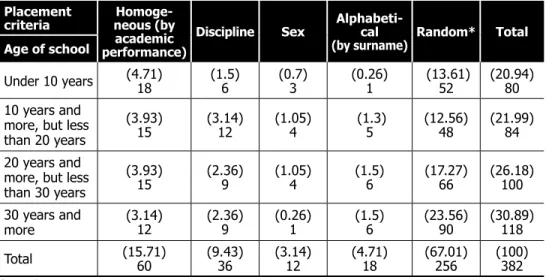This may have contributed to the current high awareness of the HIV/AIDS epidemic in the country. The majority of respondents (95%) identified showing videos about HIV and AIDS as one of the strategies.

CONCLUSION
This finding is similar to the results of the 1998 and 2003 Ghana Demographic and Health Surveys (GDHS), which showed that 88% of men and 81% of women knew that condoms could be used to prevent HIV/AIDS infection (Ghana Statistical Service and Macro International, 2004). This research question sought to unravel some practical measures that could be taken to improve the HIV/AIDS course offered by the Center for Secondary Education.
RECOMMENDATIONS
The number of student teachers involved in disseminating information on HIV/AIDS depended on the medium used.
MENTORING STRATEGY IN THE SUPERVISION OF SECONDARY TEACHER EDUCATION STUDENTS IN
THE ZIMBABWE OPEN UNIVERSITY
ABSTRACT
INTRODUCTION
The ZOU normally accepted the school's choices, but did initial training to orient all the mentors to the ZOU's requirements and transfer knowledge and skills in mentoring. In this case, the lecturer in charge was female and had already worked at the ZOU for three years before the study.
STATEMENT OF THE PROBLEM
The ZOU trained the mentors on how to carry out their mentoring responsibilities and occasionally visited the schools to supervise the students, provide support to the mentors and also assess the students' performance. The lecturer in charge of the program organized the one-day training at the regional office.
RESEARCH QUESTION
The program gave students the opportunity to study for a professional qualification from the schools where they taught as untrained university graduates. Through this training, all program mentors got to know each other and shared their experiences.
SUBQUESTIONS
This article examines the effectiveness of the mentoring strategy in guiding teacher training in open and distance learning. At the time of the study, I was working as a teacher at the Education Management Department in Masvingo.
DATA COLLECTION
Some of the data collection strategies used in case study research include direct observation, interviews, and document analysis (Tellis, 1997, Yin, 2003). The narratives in this study placed value on students' and mentors' own perceptions of the mentoring and mentoring process.
ETHICAL ISSUES
Through personal accounts, participants had the opportunity to express their views and perceptions of the mentoring process in their own language and expression. Finally, an interview was conducted with the lecturer responsible for the program in Masvingo to obtain the institution's perspective on the mentoring strategy.
DATA ANALYSIS
To ensure that my findings were credible, trustworthy and believable, I used data from various sources to capture the essence of mentoring from such diverse perspectives as documentary data from students' records, mentors' personal accounts, students' personal accounts and the observational notes that i had made I made this decision in line with Rossman and Ralli's (1998) assertion about the value of triangulation.
FINDINGS
In the early stages of teaching practice, one mentor wrote: "The student must plan his lessons more effectively.". From these gains, we note that the student teachers' gains were on the critical aspects of teaching and learning.
CONCLUSIONS
The working relationships between mentors and student teachers in this study encouraged exploration and experimentation, leading to greater development on the part of the student teachers. ZOU needs to better understand the mentoring strategy of supervising students of pedagogical education in open and distance institutions.
MAXIMISING STUDENT SUPPORT THROUGH CLUSTER MEETINGS IN A DISTANCE TEACHER
UPGRADING PROGRAMME
Key components of the support system included the housing phase and the field support phase. The design depended on participants drawing on their constructed meaning of what they perceived to be the value of study circles and cluster meetings in a learner support system.
FINDINGS AND DISCUSSION
One of the managers interviewed in the study stated, “Students use study circles to share resources. The findings were consistent with the original plans of the program's support system in the field phase.

CHALLENGES AND RECOMMENDATIONS
The use of cluster meetings and study circles helped students recognize their classmates as an important resource for advancing in the program. Not surprisingly, they all generally supported continuing the system to support student retention and performance in the program.
THE POLICY AND PRACTICE OF PLACEMENT OF PUPILS IN NIGERIAN PRIMARY SCHOOLS
Designing Open and Distance Learning for Teacher Education in Sub-Saharan Africa: A Toolkit for Teachers and Planners. Student placement is an emerging field that could contribute to overall educational success if well addressed by administrators and planners.
PLACEMENT OF PUPILS IN CLASSES
However, there is no policy in the NPE on how pupils should be placed in classes. This is why this study is about finding out what happened in the field, with a view to providing appropriate advice on how to streamline it.
SIGNIFICANCE OF THE STUDY
Therefore, the federal government has made education in the first nine years (six years at the primary level and the first three years at the junior secondary level) not only free, but also compulsory. What criteria are used in Nigeria to place primary school students to enable them to derive the maximum benefits set out in the national objectives.
RESEARCH DESIGN
The Nigerian education system at all levels recognizes and emphasizes the following positive educational values stated in the NPE (2004): respect for the value and dignity of the individual, belief in man's ability to make rational decisions, and moral and spiritual principles in interpersonal and human relations. So whatever value research can add to this level is a milestone in the right direction.
PRESENTATION OF THE RESULTS
The number in the middle of each cell is the response frequency obtained. The findings of the study were that most Nigerian primary schools adopted a random criterion in the allocation of pupils to primary schools.

DISCUSSION OF FINDINGS
Primary schools in the educationally backward states of the North basically adopted the same criteria as schools in the educationally advanced states of the South, that is, by random selection and academic performance. Using the random criterion, on the other hand, gives each student an equal chance of being in the A or B class.
IMPLICATIONS AND RECOMMENDATIONS
Even in terms of teacher quality and availability, school management may unconsciously be conditioned to have fewer quality teachers posted in Grade B on the assumption that the school was dependent on Grade A for the quality of the school's academic performance. . In case of shortage of teachers in a stream, class A got the necessary attention and not class B or C and so on.
PROFESSIONAL ETHICS IN TEACHING: THE NEED FOR A PARADIGM SHIFT
However, teachers in their profession face many challenges in the field of professional ethics. Various authors have pointed out that the challenge is related to in-service teacher training programs that hardly include issues of professional ethics (Jekayinfa, 2005, Hoyle & John, 1995).
THE CONCEPT OF PROFESSIONALISM
Different approaches provide a useful understanding of professions and their professional activities, which has led to agreement on the criteria and characteristics of the profession. According to Hoyle and John (1995), there is broad agreement on the criteria of knowledge, autonomy and responsibility.
TRAITS OF PROFESSIONALISM
This does not apply to the teaching profession, where the NUT lacks the oversight and legal backing to enforce the standards it sets. According to the above discussion, teaching in Nigeria does not meet all the characteristics of the profession in many countries of the world.
CONCEPTS RELATED TO TEACHER EDUCATION
However, in Nigeria, teaching has yet to achieve autonomy and teachers do not need a license or certificate to practice. A decree establishing the TRCN was promulgated in 1993, but it has yet to come into effect.
TRAINING AND DEVELOPMENT
This is necessary as the training received may not have contained the necessary standards that can cope with the realities on the ground. The demands behind the teaching of student teachers require that experienced supervisors and mentors be deployed to provide additional assistance to rural and community schools.
PROFESSIONAL ETHICS FOR THE TEACHING PROFESSION IN NIGERIA
We can ask this question: Learn student teachers through mentors and supervisors after they leave school. If the mentors and the supervisors are not ready to provide the mentorship, due to many protests of social inequality, the student teacher will be left stranded in the community school, without any role models to follow.
OBJECTIVES OF A COURSE IN PROFESSIONAL ETHICS
In their paper, they attribute students' determination to behave ethically as a result of their courses. Therefore, ethics training must also make employees openly aware of the ethical culture and values of the organization.
LITERATURE REVIEW
He advocates stimulating managers to become more "other-oriented" through exercises where all stakeholders are treated as equals, as opposed to their influence on company performance. Webber acknowledges research (Ferrell et al., 2002) showing how the ethical culture of an organization has a strong influence on ethical business judgments.
THE NEED FOR A COURSE ON ETHICS FOR TEACHERS
The second argument is that the ethical acceptability or unacceptability of some issues in a discipline may be unclear. A study by Bowden (2006) within the engineering profession identified a number of practices on which opinion was divided – reverse auctions being perhaps the most obvious, but bid-rigging and front-end-loading were among some of the more contentious ethical issues.
TRAINING INSTITUTIONS
THE NIGERIAN EXPERIENCE
I, ..., solemnly affirm that I will be faithful, loyal and true to the teaching profession, that as a registered teacher I will fulfill my duties honestly, to the best of my ability and faithfully in accordance with the determination of the Teachers Registration Board of Nigeria, Act 31 of 1993; that I will not allow my personal interest to influence my official conduct or any official decisions; that I will preserve, protect and defend the dignity of the teaching profession, so help me God.
THE DYSFUNCTIONALITIES OF TEACHER EDUCATION
THE PROFESSIONALISATION OF TEACHING
THE CASE STUDY OF ADEYEMI COLLEGE OF EDUCATION
In this contribution, the centrality of the teacher in the educational process was emphasized and supported with examples of various government policies implemented to accelerate national development. From a historical point of view, teacher education was presented as the focal point of the educational system, although it was limited by both historical and social factors.
INCLUSIVE EDUCATION IN GHANA
WHAT ARE THE LEVERS FOR CHANGE?
The policy guiding the principle and practice of inclusion was first adopted at the World Conference on Special Needs Education: Access and Quality, where delegates representing 92 governments and 25 international organizations met in Salamanca, Spain in June 1994 under the sponsorship meeting. of the United Nations Educational, Scientific and Cultural Organization (UNESCO) to deliberate and sign a Framework for Action on Special Needs Education and a declaration on the rights of the child. Moreover, they provide an effective education to the majority of children and improve the efficiency and ultimately the cost-effectiveness of the entire education system.
THE MEANING OF INCLUSION
Those with special educational needs should have access to mainstream schools that should accommodate them within a child-centred pedagogy capable of meeting these needs. These characteristics mean that inclusive education is developmentally oriented in nature and looks for ways to allow children with special educational needs to actively participate in mainstream/mainstream/mainstream education.
CHALLENGES TO INCLUSION
It is about 'creating a sense of community and belonging and encouraging mainstream and special schools and others to come together and support each other and pupils with special educational needs' (Department for Education and Skills, 2001). As Gyimah, Sugden and Pearson (2008) succinctly argue, teachers can reduce or eliminate the stress of meeting the needs of children with special needs and special educational needs in an inclusive environment.
GHANA’S EXPERIENCE WITH INCLUSIVE EDUCATION
It was in light of this argument that Deiner (2005) pointed out that successful inclusion involves “placing children in an educational environment that provides the supports that meet children's emotional, social and educational needs”. Inclusion can therefore be regarded as the process through which all children, including those with special educational needs, receive their education in the mainstream with structures in place to ensure participation and progress.
GHANA’S CHALLENGE REGARDING INCLUSION
In order to realize the vision of inclusion, the country has initiated pilot projects under the leadership of the Ministry of Education's special education department. Since 2003, the special education department has targeted a number of regions in the country to test inclusive education programs.
LEVERS FOR CHANGE TO IMPROVE PRACTICE
LESSONS FROM THE UNITED KINGDOM
Targeting specific subsidies on measures that will increase the capacity of mainstream schools to include students with special educational needs. In other words, practices that facilitate the inclusion of children with special educational needs should be shared.
WHAT GHANA CAN LEARN: WHAT SHOULD BE CONSIDERED?
The current situation, where individual assessors assess and recommend placement, is not suitable to meet the needs of children with special educational needs. Inclusion of children with special educational needs in mainstream schools in Ghana: Influence of teacher and child characteristics.
IMPLEMENTING BLACKBOARD
INTRODUCTION OF BLACKBOARD
Despite the existence of these documents in support of the use of technology in teaching and learning, most of the interviewees felt that the University management did not fully support the e-learning initiative. Although most faculties and departments had included in their plans the integration of technology in teaching and learning, these plans were not being implemented in some of the departments.
ADOPTION PROCESS AND APPROACHES
The director of the Center for e-Learning stated that the preparation of an e-learning policy was still ongoing, as there were aspects that were not included in the above documents, as they still need to be addressed. While the university had a student to computer ratio of 6:1, which could be considered quite good, it was felt that the infrastructure did not fully support the use of technology in teaching and learning.
THE USE OF BLACKBOARD AT CPUT
LECTURERS’ PERSPECTIVES
On the other hand, the most hated aspect of Blackboard is the unreliability of the network. However, most teachers pointed out that there was a lack of formal training for students to effectively use Blackboard for their learning.
THE IMPACT OF BLACKBOARD ON THE WAY LECTURERS TEACH
Other aspects that discourage the use of LMS are slow Internet connections and lack of time on the part of educators to learn the use of different tools and to prepare teaching and learning materials to populate the system. Most interviewees found that students taking courses through Blackboard are in favor of the system because they are able to access course materials and information online.
PERSPECTIVES FROM NON-USERS OF BLACKBOARD
In addition, most of the teachers interviewed indicated that although the Center for e-Learning provided technical support, there was no educational support. The need to call someone for help was another aspect highlighted by some interviewees.
SUCCESSES
CHALLENGES
The lack of pedagogical/educational support in the use of Blackboard affected the effectiveness of Blackboard in improving the teaching of lecturers and students. Heavy workloads have either discouraged lecturers from using the whiteboard altogether, or have discouraged them from using it as much as they would like because they do not have time to convert the teaching material into electronic format.
LESSONS LEARNT AND SUGGESTIONS FOR FUTURE IMPLEMENTATION
Providing an environment that is conducive to the effective use of technology in teaching and learning. Adequate training in the use of blackboard or technology and ongoing on-site support for academics, as well as the provision of technical and pedagogical training related to the effective integration of technology into teaching and learning.
EXPLORING STUDENTS’ UNDERSTANDING OF VALUES AND MORAL REASONING
However, if we look at the scenario from a traditional African perspective, the actions of the principal and the school met the demands of the traditional things one “should” do. In the application of the law it is viewed 'objectively', but in essence it apparently must be viewed both ways.
THEORETICAL UNDERSTANDINGS THAT UNDERPIN THE STUDY
A separate section of the questionnaire required students to complete open-ended questions in which they were faced with a series of moral dilemmas. Based on the findings of the study, it is anticipated that the questionnaire will be refined and adapted to allow for possible standardization in the future.

MORAL DILEMMAS
Participants, for example, said, “The director is not right, only the situation did it” and “[the money] is used for a good purpose and they can collect more money, but the dead body cannot be kept anymore. "; "a person's life is more important than personal or social things"; "What matters now is the fact that, since there will be a funeral for one of the students, the money for the funeral is available";. Basically, the argument was that "The money was not for the funeral"; "the school is not a funeral society and the money was raised for the trip"; "It is not their responsibility to bury that student"; and "the students worked hard to raise the money for that particular purpose (travel)".
MANAGEMENT CHALLENGES AS DRAWBACKS TO TEACHER DEVELOPMENT
Preparing a new teacher requires a paradigm shift from what the old concept of a teacher entails to what the concept of a new teacher should be, given the knowledge explosion brought on by globalization. It grew from a level of volunteer work without any legal instruments to the current level of a pensionable public service profession.
CONCEPTUAL CLARIFICATION
ANTECEDENTS OF BASIC EDUCATION AND TEACHER DEVELOPMENT
Era of State Takeover and National Universal Primary Education This was the era during which educated and concerned Nigerians expressed dissatisfaction with the irrelevance of the curriculum in schools as the emphasis was on arts, and science and technology were neglected in a country that was. The result of the NCC was the articulation of the first National Policy on Education, which was subsequently revised several times.
MANAGEMENT CHALLENGES OF TEACHER DEVELOPMENT
The result is that most urban schools, especially those in the southern part of the country, have a preponderance of female teachers in basic education. Unfortunately, many states, especially those in the northern part of the country, record low percentages of qualified teachers.

THE WAY FORWARD FOR THE NEW TEACHER
A typical example of the government's reluctance in this regard is the recently approved teacher salary structure (TSS). The issue of the TSS came up as a result of pressure exerted by the Nigerian Union of Teachers (NUT) on the Federal Government of Nigeria, because of teachers' dissatisfaction with their conditions of service. To correct the anomaly, the constitutional provision in this regard should be amended to provide for uniform teachers' salaries across the states.
SUMMARY AND CONCLUSION
At the moment, the degree program is less attractive than other disciplines, such as the natural sciences and vocational fields. The essence of the proposed study is to empirically identify the various areas of effort within the field of education in order to upgrade and make the discipline more attractive, so that newcomers will find that it is as good as other disciplines in other higher education institutions.






